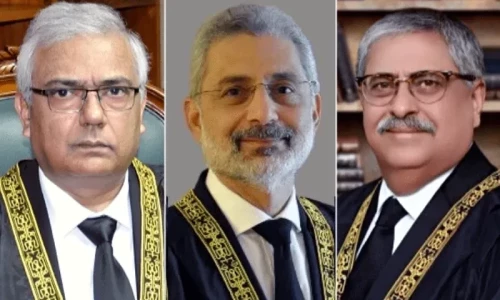The Supreme Court (SC) on Thursday linked violence in the country on May 9, when PTI chief Imran Khan was arrested, to the non-implementation of its 2019 judgement in the Faizabad dharna case.
The observations came in a written order issued by a three-member SC — comprising Chief Justice of Pakistan Qazi Faez Isa, Justice Athar Minallah and Justice Aminuddin Khan — for yesterday’s hearing on review petitions filed against the 2019 judgement.
Authored by Justice Isa years before he took oath as the chief justice, the searing 2019 judgement had instructed the defence ministry and the tri-services chiefs to penalise personnel under their command who were found to have violated their oath.
It had also directed the federal government to monitor those advocating hate, extremism and terrorism and prosecute them in accordance with the law. Adverse observations were also made against several government departments for causing inconvenience to the public as the 20-day sit-in paralysed life in both Islamabad and Rawalpindi.
Pleas were subsequently moved against the verdict by the Ministry of Defence, the Intelligence Bureau, the PTI, Pemra, the Election Commission of Pakistan (ECP), the Muttahida Qaumi Movement (MQM), AML chief Sheikh Rashid and Ijazul Haq.
The written order issued today, a copy of which is available with Dawn.com, was authored by CJP Isa. It said that the top court had “sounded a warning for the future” in the 2019 judgement.
“However, the concerns expressed by us almost five years ago were disregarded by successive governments. Review petitions and applications were filed and these were not fixed for hearing, which hindered the judgment’s implementation,” it said.
“No responsibility was affixed, nor was anyone held accountable for the violence of the past. It is not surprising that violence continued to be perceived as a permissible means to attain one’s goals.
“Victims of those striving for an independent judiciary, an inclusive and tolerant Pakistan were disregarded without justice; the nation suffered the consequences, as evident from the recent events of May 9,” the order said.
The order said that review petitions and applications were filed in early 2019 but were not fixed for several years. It said that the court acknowledged the “manipulation” resorted to by not fixing the petitions and applications.
“The Supreme Court endeavours to regain the confidence of the people by acknowledging this, and will be demonstrating that the mistakes of the past will not be repeated. Truth sets one free and makes institutions strong. The people of Pakistan deserve nothing less,” the order said.
It said that it was long overdue that institutions acted transparently and responsibly, and acknowledged when a wrong had been committed.
“Ignoring wrongdoing or offering a bare denial of it, when the facts suggest otherwise, is to have lived a lie, and perpetuated it; it is also against the interest of the public whose taxes fund all public institutions,” the order said, adding that lack of trust in public institutions endangered autocracy and threatened democracy.
“If individuals begin to overshadow the institutions they work in, they cause irreparable harm, diminish their institution, and render them as their alter ego,” the order said.
The order also considered the question of initiating contempt proceedings due to the judgement’s non-implementation. However, it noted that those who were in government when the 2019 verdict was issued were no longer in power while the composition of the ECP had also changed.
“Therefore, it would not be appropriate to hold the present incumbents responsible for the actions/inactions of their predecessors, particularly when they have demonstrated that they want to implement the decision of this court,” the order said.
It noted that the federal government had constituted a commission and given it two months to complete its task, adding that the court expected it would do so within the allotted time.
“The ECP had on the last date sought 30 days to do what it had undertaken and this period has not expired yet. The ECP should submit its report without waiting for the next date,” the order said, adding that the next hearing would be on January 22.
Faizabad sit-in
Daily life in Islamabad was disrupted for 20 days (from Oct 2 to Nov 27, 2017) when protesters belonging to religiopolitical parties occupied the Faizabad Interchange which connects Rawalpindi and Islamabad through the Islamabad Expressway and Murree Road, both of which are the busiest roads in the twin cities.
The agitators claimed that during the passage of the Elections Act 2017, the Khatm-i-Nabuwwat oath was deliberately modified as part of a larger conspiracy. The amendment to the oath was deemed a “clerical error” by the government and was subsequently rectified through an act of Parliament.
The government had attempted to negotiate in vain with the protesters to end the sit-in several times. Finally, it launched an operation to disperse the protesters, in which at least six people were killed and scores others injured. After the botched operation, the government decided to call in the army for help.
Negotiations were undertaken with protesters once again, and the government accepted a number of their demands in return for ending the protest. The agreement document bears the signatures of then interior minister Ahsan Iqbal, TLP chief Khadim Hussain Rizvi, and Gen Faiz Hameed among others.













































Dear visitor, the comments section is undergoing an overhaul and will return soon.